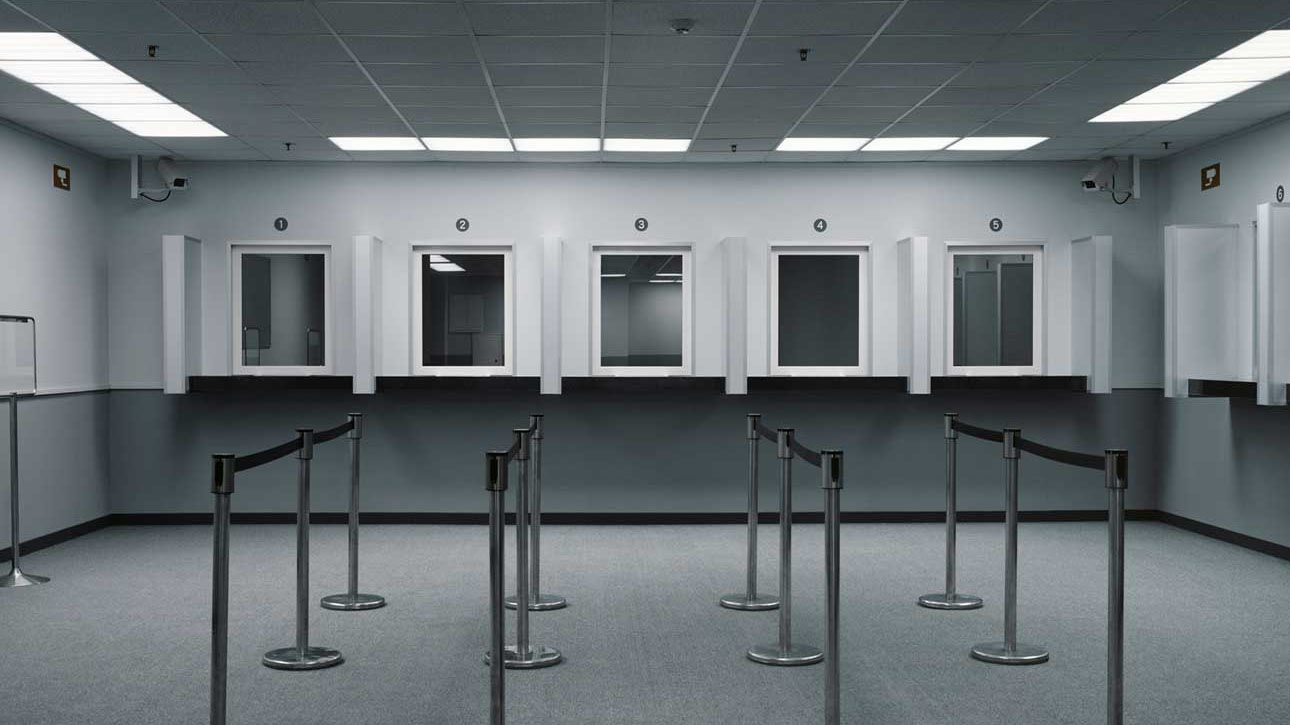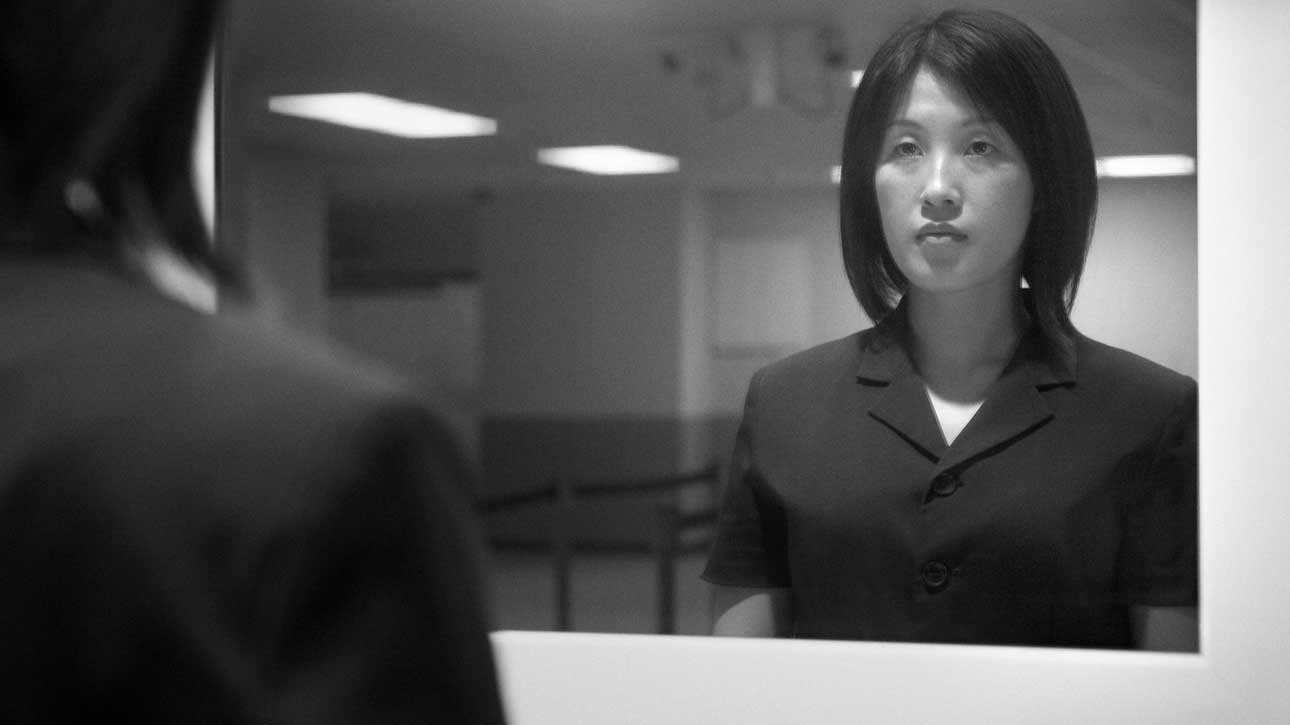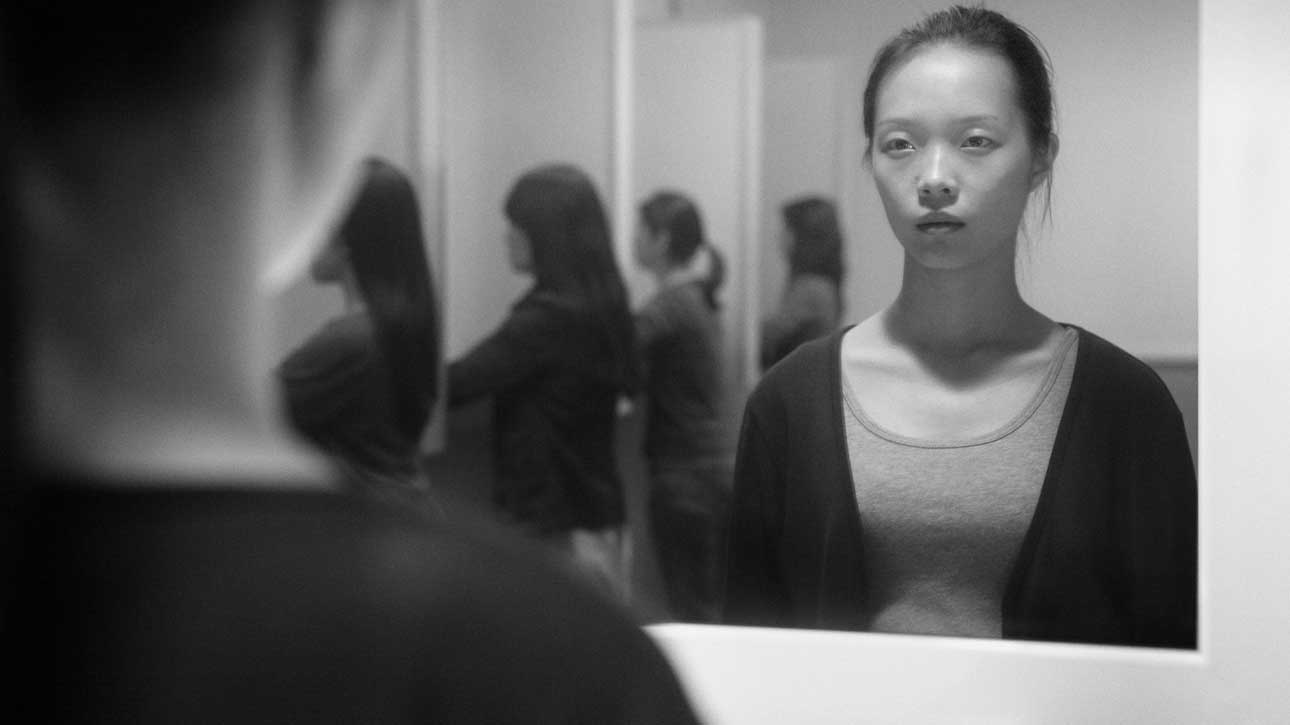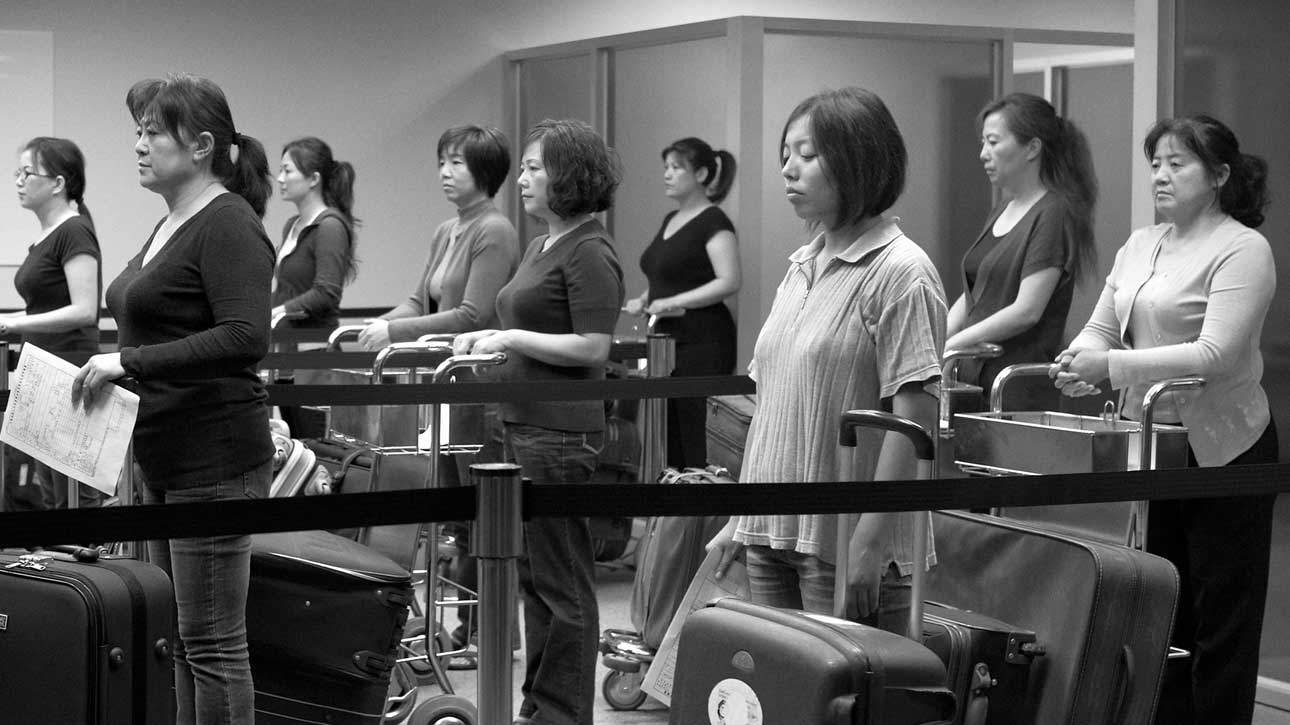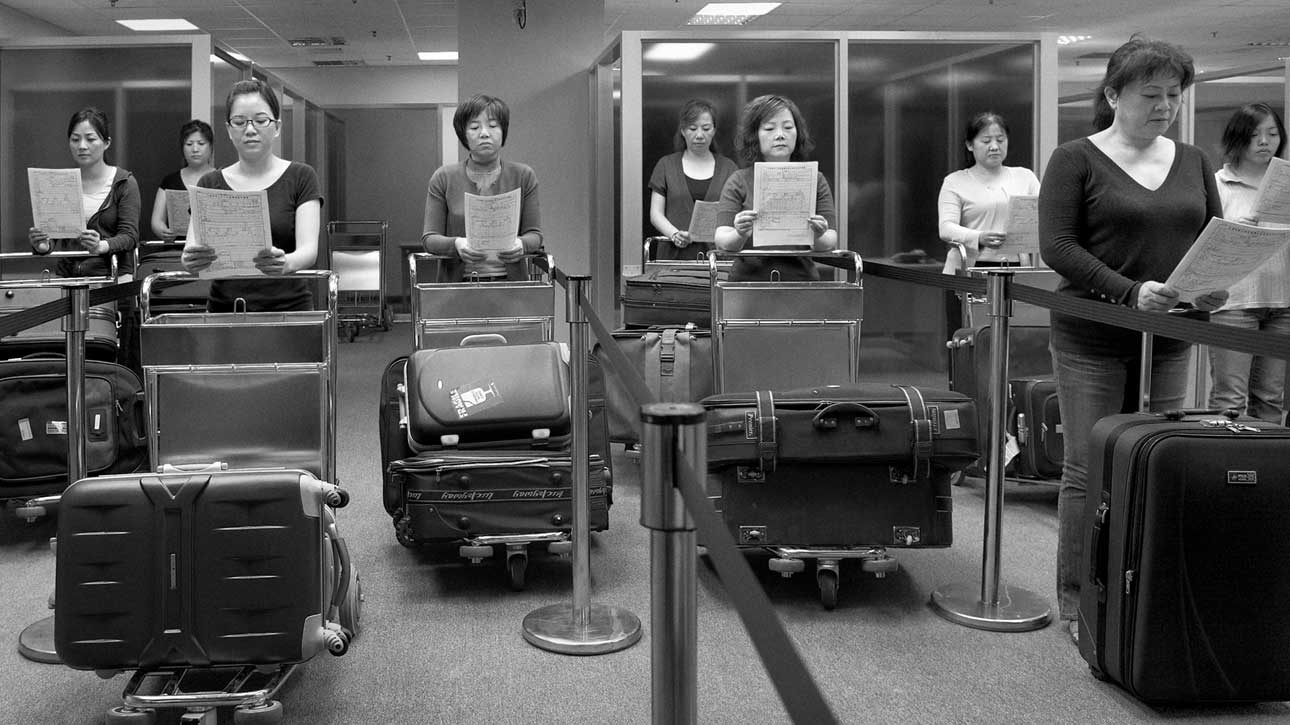Empire’s Borders I
2008—2009
35mm transferred to DVD.color & b/w.sound.26’ 50”.single-channel video + documentation
Artwork Context and Introduction
The inspiration for Empire’s Borders I came from Chen Chieh-jen’s experience applying for a U.S. non-immigrant visa after being invited to attend an art exhibition in New Orleans.(1) During a visa interview at the American Institute in Taiwan (AIT),(2) Chen was accused of intending to remain in the United States illegally and his application was denied.(3) U.S. citizens on the other hand, can enter Taiwan at any time without a visa. When Taiwanese citizens (as well as those of many other non-western countries) wish to travel to the United States, they must present many documents including proof of sufficient financial resources to guarantee that they will not remain in the U.S. illegally. They must also submit to fingerprinting, which forms part of a dossier used by the U.S. government to monitor visitors, and also a discriminatory interrogation at the hands of a consular officer.
Chen started his blog entitled The Illegal Immigrant to protest the long-standing, unfair U.S. colonial-style visa system. The blog welcomed others who had also faced discrimination and abusive language at AIT visa interviews to share their experiences, and served as a forum for discussing the structural basis for this discriminatory system and how it might be changed.
Chen then used the blog postings to develop his two-part video Empire’s Borders I. The first part narrates eight typical cases of Taiwanese citizens who applied for non-immigrant visas at AIT, were abused by consular officers and then denied for unknown reasons.(4) The second presents the plight of eight Mainland Chinese who came to Taiwan to live with their Taiwanese spouses, and starts from airport immigration interviews and continues with the various forms of scrutiny and discrimination they suffered at the hands of the Taiwanese National Immigration Agency.(5)
The contrasting examples presented in the video reflect today’s global stratification of power, as well as the border control policies of stronger nations and their governance and discipline of citizens of weaker nations. The video also criticizes the Taiwanese government for entrenched Cold War ideologies and strategies used to administer less empowered individuals residing in other regions.
For this video Chen constructed sets of the interview rooms at AIT and those at the airport offices of the Taiwanese National Immigration Agency, thus making visible and audible these sovereign spaces closed to the public by national authority. For the video’s first section, which was filmed on the AIT set, Chen invited performers involved in Taiwan’s little theater movement to narrate the accounts posted to his blog in a reportage-style format. The second section filmed on the set of the airport interview rooms features the actual Mainland spouses, who give firsthand accounts of the inhumane treatment they received from the Taiwanese National Immigration Agency.(6) The various monologues composing the video allow voices once hushed by national authority to create dialogs with the video’s audience.
Chen created The Illegal Immigrant and Empire’s Borders I to re-visualize countless instances of discrimination and layers of popular history that have been concealed or left unrecorded by mechanisms of national sovereignty. These people’s memories are seen, heard and offered for speculation in this series, which as a form of activism serves as a starting point for rooting out imperialist ideologies.
Afterword
Since 1950 Taiwan has been a subordinate region under U.S. domination.(7) For 30 years following the end of the Taiwanese government’s travel ban in 1979, sentiment in Taiwan had been quietly brewing against AIT, and it was only with Chen’s 2008-9 release of his activist works The Illegal Immigrant and Empire’s Borders I that the unfair, colonial-style U.S. visa policy was first discussed publicly. Detailing AIT consular officials’ discriminatory language and mysterious denial of visas, Chen’s series documents the memories of Taiwanese people.
AIT established an official Facebook page in February of 2010, which was quickly filled with waves of complaints protesting the U.S. visa policy. Later, AIT deleted all negative comments from its Facebook account.(8)
It was only after the Taiwanese government agreed to buy an expensive U.S. arms package, to allow imports of bone-in beef products and offal suspected of carrying mad cow disease and of beef containing traces of the leanness-enhancing feed additive ractopamine (all conditions benefiting the U.S.), and to meet seven requirements of the U.S. anti-terrorism framework, which included the issuance of biometric passports, exchange of intelligence data requiring the installation of an information transmission system, and implementation of the Electronic System for Travel Authorization, that AIT announced Taiwan was eligible for the U.S. Visa Wavier Program (VWP) on December 22, 2011. On October 2, 2012, the U.S. Department of Homeland Security announced that Taiwanese citizens would be eligible to travel to the U.S. under the VWP starting on November 1, 2012.
Chen believes that “even though Taiwan will become a VWP country, every individual in the world still must live under the U.S. led neoliberal, new world order and anti-terrorism framework, which means increased monitoring through technology such as biometric passports, terrorist intelligence data exchange, the travel authorization system, a facial recognition system, and the collection of biometrics such as fingerprints. Having been dominated and subordinated for so long, the people of Taiwan should more than ever, deeply and broadly join others around the world who are being discriminated against, and based on their individual experiences of discrimination, develop new liberating policies through networked actions.”
Notes
- Chen Chieh-jen was invited to attend the first New Orleans Biennial after Hurricane Katrina, whose theme was the rebuilding of New Orleans.
- According to the Taiwan Relations Act (a U.S. domestic law), the American Institute in Taiwan was established on January 1, 1979 to preserve U.S. hegemony in the Pacific Region after the U.S. transferred official diplomatic recognition from Taiwan to the P.R.C. government. As a non-profit organization, AIT provides services including the processing of visa applications for Taiwanese citizens.
- According to a press release published by the Taiwan Central News Agency on September 30, 2008, AIT indicated that Chen Chieh-jen’s statements about this incident were nonfactual.
- Posts left on the blog The Illegal Immigrant indicate that most visas were denied to single women who had received higher education, could speak English, and did not have fixed assets.
- After the filming of Empire’s Borders I, the Taiwan Legislative Yuan amended the Act Governing Relations between the People of the Taiwan Area and the Mainland Area on June 9, 2009, shortening the waiting period for identity cards from eight years to six for Mainland spouses. The act also stipulates that Mainland spouses who lawfully enter Taiwan no longer have to wait two years to apply for a permit, but obtain the right of employment upon arrival. Regarding fundamental human rights, however, Mainland spouses are still treated more harshly than other foreign spouses.
- The second section of Empire’s Borders I was filmed with the assistance of The Marriage Association of Two Sides of China, as well as mainland spouses who were under possible duress created by the Taiwanese National Immigration Agency, yet were still willing to relate their experiences in person.
- Evidence of U.S. domination of Taiwan can be found in the collected accounts of labor activists entitled Taiwan Economic History for Workers, published by the Labor Affairs Bureau of Kaohsiung City Government. Regarding Taiwanese politicians’ subordination to the U.S., see reports on the Taiwan page of the WikiLeaks website http://wikileaks.org/wiki/Category:Taiwan [Accessed May 10, 2024], or the book Wikileaks – Taiwan, published by the China Times Publishing Company.
- Details regarding this can be found in a February 9, 2010 report by the TVBS Internet news website. https://news.tvbs.com.tw/politics/82130 [Accessed May 10, 2024]
